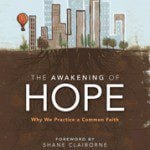 In the desert monastic tradition, women and men who left the city to pray in the abandoned places of their society made a spiritual discovery: when you get down to the most basic level of our struggle against the devil and all his wiles, what we wrestle against is not bad political leaders or corrupt business executives. Our enemy is neither the people who’ve done us wrong nor the people who are using our neighbors for their own ends. Though we may be tempted to think so at our worst moments, our enemy is not even ourselves. The enemy, the desert ammas and abbas taught us, is bad thoughts. When we give into them, they corrupt our souls, our relationships, our society, and God’s good creation.
In the desert monastic tradition, women and men who left the city to pray in the abandoned places of their society made a spiritual discovery: when you get down to the most basic level of our struggle against the devil and all his wiles, what we wrestle against is not bad political leaders or corrupt business executives. Our enemy is neither the people who’ve done us wrong nor the people who are using our neighbors for their own ends. Though we may be tempted to think so at our worst moments, our enemy is not even ourselves. The enemy, the desert ammas and abbas taught us, is bad thoughts. When we give into them, they corrupt our souls, our relationships, our society, and God’s good creation.
But they do not have to. The great discovery of desert monasticism was that we can name these bad thoughts and so unveil their illusory power. We can plead the blood of Jesus and watch them flee.
The monastics called this practice the “manifestation of thoughts,” and it was the bedrock of the spiritual direction they offered both to one another and to the seekers who came asking for a word. In Western Christianity, this practice turned into confession. And when confession started to look like another way for Christendom to exercise control over people, it faded away from common practice, especially among Protestants. There were good reasons for this, not the least of which being that shame can suffocate a soul when bad thoughts are not met with grace, but with harsh condemnation.
Still, there’s a wonderful power in this ancient tradition of the manifestation of thoughts, especially for those of us who are engaged in a life and death struggle with the Unspeakable. This is why, in our new Common Prayer Pocket Edition, we included a series of prayers against the eight bad thoughts. It can be a great gift to have words that both name these thoughts clearly and claim the power of Jesus to overcome them. Like Antony of Egypt, I’ve found that such words can save your life.
Last week, I had the chance to spend a day with a wonderful group of people who wanted to learn more about the desert tradition and the resources it offers for ministry in our world today. As a part of our workshop, we took time to name the basic thoughts that each person struggles with. After writing them out on paper, we created a little liturgy to “manifest” them together. I share it here as an invitation for you to add the thought that is trying to take your life and plead the blood of Jesus in defense.
I struggle with pride. I have lots of balls juggling in the air, and I am loathe to admit that I cannot manage them all. I’d hate to let anyone down. I’d not want to admit failure.
Against the torrent of oblivion, we plead the blood of Jesus.
I struggle with a deep desire to be comfortable in some selfish ways. Sometimes it’s a lack of care, and sometimes it’s real anger and impatience when things don’t go my way. I want life to be easy.
Against the torrent of oblivion, we plead the blood of Jesus.
I struggle with the desire to be significant in the face of weakness.
Against the torrent of oblivion, we plead the blood of Jesus.
I am afraid of disappointing those who rely on me.
Against the torrent of oblivion, we plead the blood of Jesus.
I struggle with thoughts that judge others and myself, as well as feelings of guilt surrounding my own shortcomings.
Against the torrent of oblivion, we plead the blood of Jesus.
I struggle with an anger that invites me to be resentful because I don’t get to spend my time where I want. Then I get mad at myself because I know it’s not all about me.
Against the torrent of oblivion, we plead the blood of Jesus.
I vacillate between pride and self-deprecation. I often find myself wanting more, some future glory or amazing calling somewhere else.
Against the torrent of oblivion, we plead the blood of Jesus.















